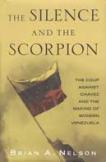A Powerful Grip
In December 2002, during a national strike called by Venezuela’s opposition to protest against President Hugo Chávez, a reporter in Caracas asked me a most unusual question: “Is this strike working or not?” I said I had no clue. After all, she was on the scene and I was 2,000 miles away in Washington, D.C. Half the people told her it was a great success, she said, while the other half claimed it was an utter failure. “What is going on?”
That journalist got a taste of the extraordinary polarization that has marked Venezuela since Chávez came to power more than a decade ago. Contradictory versions are part and parcel of analyses of Venezuelan politics, mirroring a sharply divided society. Chávez has become a favorite topic for authors, but the books written to date have tended to be either hagiographies or screeds attacking the Venezuelan leader. Impartial, balanced treatments are all too rare.
Fortunately, Brian A. Nelson’s The Silence and the Scorpion is anything but tendentious. Nelson’s refreshingly impartial and objective account focuses on the coup of April 11, 2002, in which the Chávez government was deposed. He uses this seminal event as an instructive vehicle to capture the rancor and mistrust among Venezuelans. Through extensive and probing interviews with those lined up on opposite sides of the conflict, Nelson effectively conveys the strong sentiments Chávez tends to arouse. He offers insight into the motivations of both Chávez supporters and detractors as well as an understanding of why reconciliation has been so elusive.
Nelson provides the reader with adequate context and background, but the vivid depictions of the famous, infamous and anonymous characters involved in the events surrounding the coup are the heart of his book. Rather than a neat-and-tidy story of good versus evil, what emerges is a highly confused series of actions and reactions, in which chavistas, or Chávez supporters, and the opposition feed off each other. Nelson highlights the coup-related violence in great detail, but also explains how the military, worried that they might be instructed to use violence against fellow Venezuelans to defend Chavez, did not stand in the way of the coup. Given the depth of the acrimony, it is fortunate that the toll from those tragic days was not even greater.
The Silence and the Scorpion makes it easy to understand why, more than a decade after coming to power, Chávez remains the country’s most dominant and popular political figure. With superb communication skills and seductive rhetoric, Chávez put his finger on the legitimate grievances felt by Venezuela’s poor majority, and his appeal for greater social justice has resonated. Despite the recent drop in prices, Chávez has been fortunate to have lots of oil revenue to spend on social projects. He also benefited from a notably inept political opposition and popular anger at the discredited political class that had presided over the country’s stunning decline in the 1980s and 1990s.
In fact, one of the book’s most absorbing sections deals with the ill-fated presidency of the Venezuelan business leader and opposition figure Pedro Carmona, who briefly came to power once Chávez was deposed. Nelson describes the near delirium that reigned in the opposition after Chávez fell, inspiring the Carmona government to roll back his political program—including suspending the 1999 Constitution and dissolving the elected national legislature. Carmona badly overreached, alienating those in the opposition committed to democracy and mobilizing chavistas to rally around their leader. As has often been the case in Venezuela, opposition missteps ended up only bolstering Chávez.
More than seven years later, politicians—some from the old, “traditional,” parties, others less experienced—have largely replaced businessmen, union leaders and media owners in the Venezuelan opposition. Though increasingly subject to government harassment and intimidation, the opposition today is striving to find an appealing alternative and an effective leader to challenge Chávez in 2012.
Nelson’s treatment of the disputed role of the U.S. government in the 2002 coup is balanced and scrupulous. There is little question that the Bush administration barely disguised its glee when the coup took place, which badly undermined U.S. credibility on democracy. It is equally clear that those involved in the coup had had contact with U.S. officials. But as Nelson rightly notes, there is no evidence that this coup was manufactured by the United States or was in fact anything other than a product of domestic political tensions.
Though he says he was initially sympathetic toward Chávez, Nelson has become critical of his penchant for confrontation. That explains the book’s title, which comes from a Venezuelan general’s description of Chávez as a scorpion: “By his nature he was militant and aggressive and could never change.” Despite his political gifts, Chávez has not governed effectively or taken advantage of the opportunity to transform his country in a positive way. His perpetual political battles do little to resolve the country’s underlying problems of crime, corruption and economic mismanagement.
This book is a welcome contribution to the burgeoning literature on Venezuela under the controversial rule of Hugo Chávez. The 2002 coup gives the author a good handle to employ his impressive investigative and storytelling talents, and he succeeds in shedding new light on the complex questions facing Latin America’s most polarized society. Given his rare access and credibility with key actors on both sides of the political spectrum, Nelson should consider tackling the next chapter in Venezuela’s evolving drama.
This article also appeared in print, under the headline “A Powerful Grip,” in the July 20, 2009, issue.








